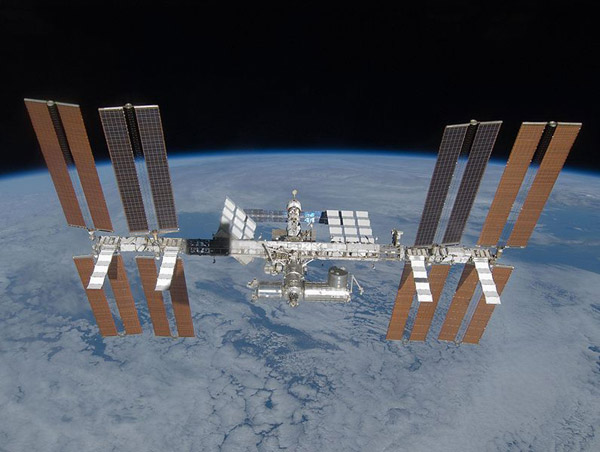Space hotel for tourists could open by 2016
Asia | September 27th, 2011
Source
 Source: Orbital Technologies
Source: Orbital Technologies
A Russian space firm has ambitious plans to open a space hotel for tourists by 2016 – with a vision to offer a new age of commercial space travel for the super rich.
Orbital Technologies says it hopes to build a commercial space station hotel pod 217 miles above the earth.
The four-room orbiting hotel would house up to 7 guests and offer ‘out-of-this-world’ views of earth through giant viewing windows.
A ride to the hotel would take two days aboard Russia’s Soyuz spacecraft.
The experience would be limited to those able to afford its $1 million (£500,000) price tag for a five day stay, plus a little over $800,000 (£500,000) for the journey up there.
However space travel – and the unavoidable weightlessness– doesn’t lend itself well to luxury.
The hotel’s amenities will be on the light, if not minimal side, and guests will have to eat space food, use vacuum toilets and take sponge baths. While drinks will be limited and non-alcoholic.
Despite a struggle for funding, Russia believes it is well placed to grab a share of the private space tourism market. It is currently the leader in space travel – as its Soyuz spacecraft is, for now, the only way for astronauts to reach the International Space Station after NASA’s space shuttle retired earlier this year.
A handful of private companies have joined the race to fill the gap left by NASA, and Russia’s partly state-owned space contractor, RKK Energia is looking to fund a new spacecraft that could replace the Soyuz rocket.
While the concept of staying at a space hotel will remain a fantasy for aspiring space tourists, there are signs that commercial space travel could become more affordable – at least for the middle classes – in future.
Richard Branson hopes his spaceship company, Virgin Galactic will be ready to launch short duration, edge-of-space flights for tourists by 2013. The company is believed to have already sold 430 tickets for space travel – at $200,000 (£150,000) a ticket. Its new spaceport- which will serve as the headquarters for Virgin Galactic’s space flights- is still under construction in the desolate sand plains of New Mexico (US), and is expected to open its doors in two years time.
Asia | September 27th, 2011
Source
 Source: Orbital Technologies
Source: Orbital TechnologiesA Russian space firm has ambitious plans to open a space hotel for tourists by 2016 – with a vision to offer a new age of commercial space travel for the super rich.
Orbital Technologies says it hopes to build a commercial space station hotel pod 217 miles above the earth.
The four-room orbiting hotel would house up to 7 guests and offer ‘out-of-this-world’ views of earth through giant viewing windows.
A ride to the hotel would take two days aboard Russia’s Soyuz spacecraft.
The experience would be limited to those able to afford its $1 million (£500,000) price tag for a five day stay, plus a little over $800,000 (£500,000) for the journey up there.
However space travel – and the unavoidable weightlessness– doesn’t lend itself well to luxury.
The hotel’s amenities will be on the light, if not minimal side, and guests will have to eat space food, use vacuum toilets and take sponge baths. While drinks will be limited and non-alcoholic.
Despite a struggle for funding, Russia believes it is well placed to grab a share of the private space tourism market. It is currently the leader in space travel – as its Soyuz spacecraft is, for now, the only way for astronauts to reach the International Space Station after NASA’s space shuttle retired earlier this year.
A handful of private companies have joined the race to fill the gap left by NASA, and Russia’s partly state-owned space contractor, RKK Energia is looking to fund a new spacecraft that could replace the Soyuz rocket.
While the concept of staying at a space hotel will remain a fantasy for aspiring space tourists, there are signs that commercial space travel could become more affordable – at least for the middle classes – in future.
Richard Branson hopes his spaceship company, Virgin Galactic will be ready to launch short duration, edge-of-space flights for tourists by 2013. The company is believed to have already sold 430 tickets for space travel – at $200,000 (£150,000) a ticket. Its new spaceport- which will serve as the headquarters for Virgin Galactic’s space flights- is still under construction in the desolate sand plains of New Mexico (US), and is expected to open its doors in two years time.

 The International Space Station (ISS) is a habitable, artificial satellite in low Earth orbit. The ISS follows the Salyut, Almaz, Cosmos, Skylab, and Mir space stations, as the 11th space station launched by man not including the Genesis I and II prototypes.
The International Space Station (ISS) is a habitable, artificial satellite in low Earth orbit. The ISS follows the Salyut, Almaz, Cosmos, Skylab, and Mir space stations, as the 11th space station launched by man not including the Genesis I and II prototypes.